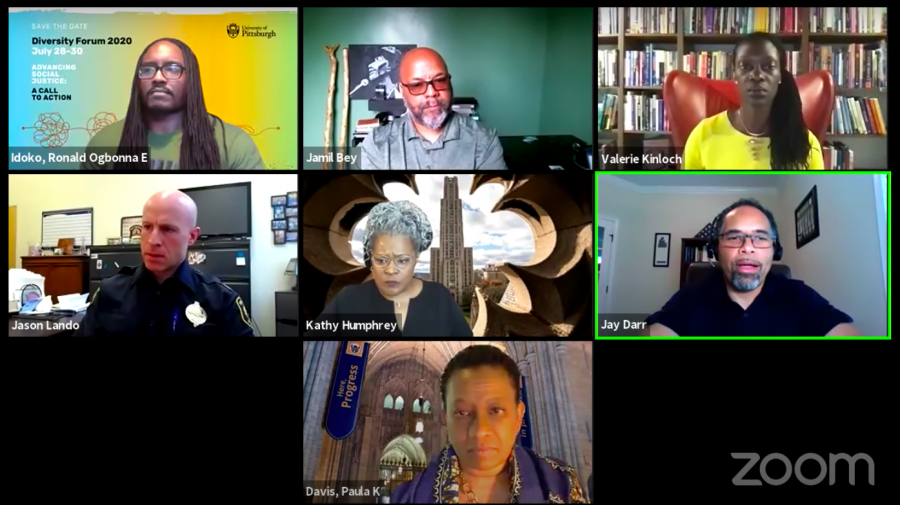Virtual town hall examines the history between race and justice
The town hall explored the ways in which members of the community can begin and sustain productive conversations.
June 4, 2020
According to Jamil Bey, America is still not ready to have a conversation about large-scale social change because it does not have the proper leadership to direct such a movement.
“This is a country that incarcerates more of its population than any other country on Earth. Almost every police killing of unarmed suspects, whether they’re black, brown or white, go unprosecuted,” Bey, the president and CEO of the UrbanKind Institute, said. “The country is ripe for change and transformation, but we don’t have leadership that is ready to direct us through this conversation.”
The Office of Diversity and Inclusion presented the “I Can’t Breathe: From Agony to Activism” virtual town hall Wednesday afternoon, a last-minute addition to the “This is Not Normal: Allyship and Advocacy in the age of COVID-19” town hall series. The meeting was added as part of newly announced community measures to strengthen racial equity and justice on campus, in response to the death of George Floyd at the hands of Minneapolis police.
The town hall focused on how Pittsburgh and the nation must respond to acts of racial injustice, and explored the ways in which members of the community can begin and sustain productive conversations. Ron Idoko, the diversity and multicultural program manager in the Office of Diversity and Inclusion, and Paula Davis, the assistant vice chancellor for health sciences and diversity, moderated the event.
Jason Lando, the commander of the City police’s vice and narcotics division, said he was disgusted at the actions of the Minneapolis police officers that led to George Floyd’s death. Derek Chauvin, the officer that knelt on Floyd’s neck for more than eight minutes, has since been charged with third-degree murder, later upgraded to second-degree. Three other officers at the scene of the killing have been charged with aiding and abetting murder.
“As a commander in the Pittsburgh police, a 20-year veteran, I’ve always prided myself on the way we treat people. That is not the way we treat people,” Lando said. “I was disgusted by what I saw. I’ve had many sleepless nights over it.”
Lando said he and other City police officers have worked over the last several years to introduce training in areas such as procedural justice and implicit bias.
“Even though the incident with George Floyd didn’t happen in Pittsburgh, I think all you need to do is turn the TV on and see that everywhere across the country, everyone is affected,” Lando said.
According to Valerie Kinloch, a panelist and the dean of the School of Education, making these kinds of institutional changes first requires us to name the crisis that we are in.
“We have to take a breath, but what happens when that breath is taken away from us?” Kinloch said. “We can’t move forward as a nation, country or world without naming systemic oppression. We cannot move forward without naming white supremacy. We cannot ever move forward without naming the histories, the legacies of assault that have always been directed towards black and brown bodies in this country and in this entire world.”
Kinloch added that nothing about this work is new. These issues come directly from a legacy of racism, white supremacy, capitalism and oppression, she said, and the only way we can effectively mobilize against it is if we recognize our place in it.
“We cannot be anti-racist if we are not asking ourselves what we are doing, how we are responsible, how we are implicated in this and then what are we going to do to ensure the lives of black people and indigenous people are not just protected, but recognized and valued in everything that we do,” Kinloch said. “That’s the work that lies ahead.”
Naming the systems of oppression and our complicitness in them is the easy part, Kinloch said. What is hard is taking action against the system itself.
“I want to name it as systemic racism and oppression. I want to name it as capitalism. I want to name it as the legacy of colonialism and white imperialism. I want to name it as work that is racist and anti-black,” Kinloch said. “Then I want to be able to work with people to say ‘How do we think about justice and equity, and what is it that we need to do to really change systems and institutions to respond to the realities in which we all live?’”
Bey echoed Kinloch’s words and said institutions such as capitalism are not always recognized first as a driving force behind racism. But he added it is important to examine the history of how these societal foundations were created, as many found their way into daily life through colonial endeavors.
“These institutions that were designed and developed and evolved through the experiences of racism and colonialism, they have to be dismantled,” Bey said. “All of our models are based on that framework. Our work, if you want to help the black community, is to dismantle and re-create life-affirming institutions.
In order to dismantle these systems, University Counseling Center Director Jay Darr said, we have to be willing to uplift marginalized voices and create equitable environments for all members of the community.
“We can’t be bystanders to acts that discriminate against our colleagues,” Darr said. “As people of color, people with invisible identities, we can’t stand by that, so we have to speak up. I think that also helps to dismantle the framework as well. The silence has to stop.”
In law enforcement, Lando said the only way to do this is for officers to put in more effort and make personal connections with the communities they swear to protect. In his previous role as the City police Zone 5 commander, an area with “very low trust” of law enforcement and “very low to no community engagement” from police officers, Lando created an initiative to connect more with the younger members of the community.
“When we saw each other out in the street, we weren’t painting each other with a broad brush,” Lando said. “Imagine if we worked really hard at this and we got to the point where, whenever we got on a call, or whenever we were dealing with an incident, we had some connection to someone at that incident.”
While it is important to be embedded in communities, Kinloch said, creating relationships is not as simple as establishing a physical presence in the communities. What creates relationships is the ability to listen without judgement, and being invited into these spaces.
“Don’t assume that you can just enter into communities, especially black and indigenous communities, and have a relationship with people,” Kinloch said. “[You must be] willing to understand the legacies of oppression in many of our communities in ways where we are not defensive. In ways where we do not enter into other communities thinking that we know what they need to do.”
According to Darr, the Counseling Center has worked to use its place in the community in order to assist students of all backgrounds. In an effort to do so, the Counseling Center has “revived” its multicultural care team to ensure it provides appropriate resources to the diverse body of students it serves.
“Whether it’s our policy and procedures, whether it’s our digital presence, whether it’s our collateral that we send out, whether it’s our training, everything has to be operationalized from that lens to stamp out racism and oppression,” Darr said.
Darr encouraged Pitt community members to take advantage of the mental health resources they have access to in order to continue to fight for change.
But as people across the nation continue to fight for change, Kinloch said, everyone must be conscious of the larger social systems they take part in, and use their place within those structures to dismantle them from the inside out.
“If we take part in those structures and we don’t use our privilege to support, to uplift and to center black and brown communities, what are we really doing?” Kinloch said. “That’s not anti-racist, that is oppressive. That is reproducing a system of inequities and inequalities that continue to disenfranchise black and indigenous people across the entire world.”



